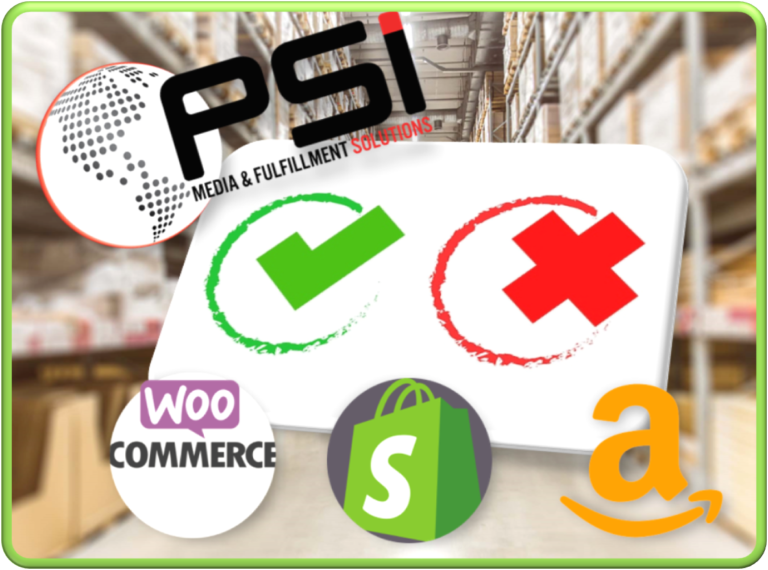
Is Amazon the right fit for your e-Commerce business?
The Pros and Cons
As a 3rd party fulfillment center for several e-Commerce businesses, we see many different platforms for online sales. Our customers often ask if we think selling on Amazon makes sense. It is seldom a cut and dry answer, but it is always important to understand the pros and cons of Amazon in order to make an educated decision Through the years, we have accumulated a list of the top pros and cons when evaluating Amazon as a sales platform.
There is no question e-Commerce businesses using Amazon can benefit from its vast customer base, global reach, and robust infrastructure. Here are some benefits of selling on Amazon:
AMAZON PROS
1) Access to a Large Customer Base: Amazon has millions of active customers worldwide, providing businesses with an opportunity to reach a massive audience. This can potentially lead to increased sales and brand exposure.
2) Global Reach: Amazon operates in multiple countries, allowing businesses to expand their customer base internationally without the need for extensive infrastructure setup in each location.
3) Fulfillment by Amazon (FBA): Amazon offers FBA, where sellers can store their inventory in Amazon’s warehouses and utilize their efficient shipping and fulfillment services. This saves businesses time and effort in managing logistics.
4) Trust and Credibility: Amazon is a well-known and trusted platform. Selling on Amazon can provide a level of credibility to new or lesser-known businesses, as customers are familiar with the platform’s reputation for reliable transactions and customer service.
5) Marketing and Advertising Opportunities: Amazon provides various marketing and advertising tools that can help businesses increase their visibility, such as sponsored product ads, deals, and promotions.
Despite these benefits, there are also challenges associated with relying solely on Amazon for e-commerce sales. Here are a few considerations:
AMAZON CONS
1) Increased Competition: Amazon’s marketplace is highly competitive, with numerous sellers vying for customer attention. It can be challenging to stand out and differentiate your brand from the competition, especially in crowded product categories.
2) Limited Control over the Selling Experience: Amazon has strict guidelines and policies that sellers must adhere to, and their platform’s design and branding may limit customization options. This can restrict a business’s ability to fully control and tailor the shopping experience for their customers.
3) Fee Structure: Selling on Amazon involves various fees, including referral fees, fulfillment fees, and advertising fees. These costs can destroy a business’s profit margin, particularly for low-priced products.
4) Dependency on Amazon: Relying solely on Amazon for sales means putting your business’s fate in the hands of a third-party platform. Changes in Amazon’s policies, algorithms, or competition can have a significant impact on your business’s success.
On the other hand, selling on your own e-commerce website offers distinct advantages:
E-COMMERCE WEBSITE PROS
1) Brand Control and Customization: Having your own website allows you to fully control the branding, design, and customer experience. You can tailor the website to reflect your unique brand identity and differentiate yourself from competitors.
2) Direct Customer Relationships: Selling on your own website enables you to establish direct relationships with your customers. You have access to their data and can personalize marketing efforts, build customer loyalty, and gather valuable insights.
3) Flexibility and Pricing Control: With your own website, you have greater control over pricing, promotions, and sales strategies. You can experiment with different approaches and adjust them based on your business’s needs and goals.
4) Diversification and Independence: Operating your own e-commerce website allows you to diversify your sales channels. This reduces reliance on a single platform and provides more independence and control over your business’s growth.
However, running an independent e-commerce website also presents challenges such as attracting traffic, handling logistics, and building trust with customers who might not be familiar with your brand.
In summary, while selling on Amazon offers access to a vast customer base and streamlined processes, selling on your own e-commerce website provides greater control, brand customization, and independence. Ultimately, the decision depends on the specific goals, resources, and priorities of each business. Some businesses may find success by leveraging both platforms in a multi-channel strategy.
It doesn’t have to be an “either or” scenario. If a customer is interested in selling on Amazon, it can be pretty easy to get started while also selling on an e-Commerce website. At PSI, we can easily integrate with multiple marketplaces and platforms so inventory, orders and reporting are still stored in one easy to manage warehouse system. We also have the ability to ship FBM (fulfilled by merchant) Amazon orders, so you can take advantage of the vast reach on Amazon while leveraging our extremely affordable fulfillment and shipping pricing model.
Let us know if we can help you and your business today. If you’d like to learn more, feel free to reach out to us at sales@psidiscs.com
Thank you!
PSI Sales and Marketing Team
